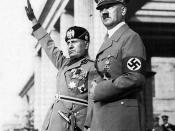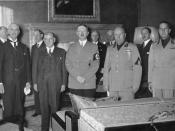Britain and France chose the path of appeasement in hopes that this would satisfy Hitler and not drag Europe into another world war. Appeasement came from the desire to make amends and prevent war at all costs. Appeasement seemed to be working for small problems but when applied to choices like the fate of a country, appeasement caused more problems than it solved. Events in Europe and Britain between 1989-1939 pressured Chamberlain into abandoning his policies for appeasement.
Events in Europe pressured Chamberlain to abandon appeasement. On September 28th 1938, Chamberlain, Mussolini, Daladier and Hitler came together to sign the Munich Agreement which handed Sudetenland over into German hands. The Munich Agreement was the turning point for British opinions about Hitler and Chamberlain. On August 21st 1939, Hitler tried to make a deal with Great Britain. He said that if they allowed him to take Danzig and all the colonies that use to belong to Germany, they would defend the British Empire.
The next day, Hitler invaded Poland. It became obvious that Hitler was not someone to be trusted. Chamberlain commented on Hitler's invasion of Czechoslovakia as "a shock to the confidence". Just as things couldn't get any worse, something shocking happened. Mortal enemies, Stalin and Hitler, signed the Nazi-Soviet Non-aggression pact. The two countries agreed to not go to war with one another for ten years, divide Poland in half and Hitler even offered Stalin the Baltic States. Great Britain declared war on Germany on September 3rd 1939, marking the official beginning of World War II. With each event and the one following it, it became clear that war was unavoidable. It showed appeasement was not working and the only way to solve anything was through military force. Up until 1939, Britain found the easy way out of...


